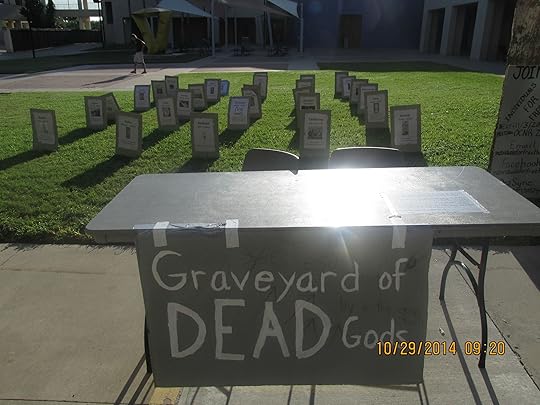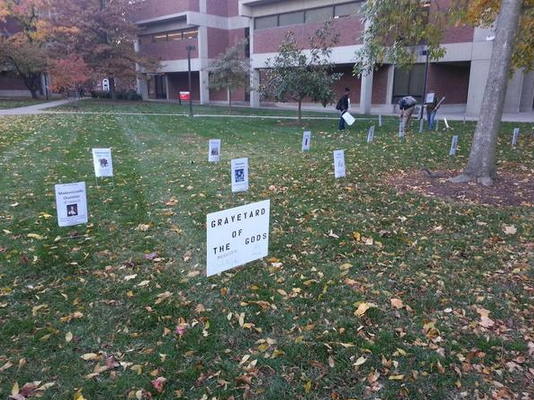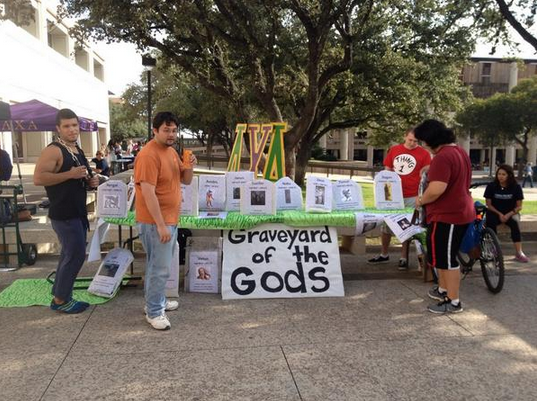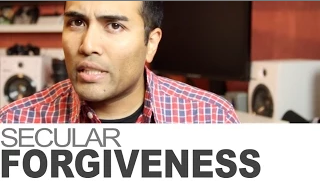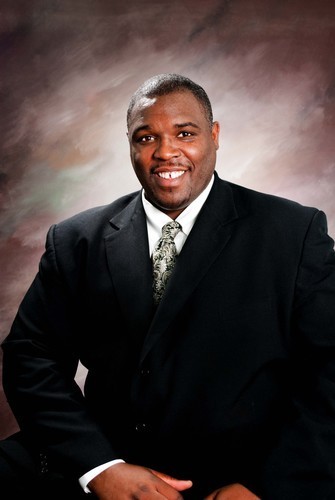Hemant Mehta's Blog, page 1887
October 31, 2014
Why Are Oklahoma Elementary School Students Taking Field Trips to a Zoo Run By Creationists?
If you run a public elementary school in Oklahoma that’s about 20 minutes away from the Tulsa Zoo, it would make perfect sense to schedule field trips there.
So why did the Skiatook Public Schools take children on multiple trips to the Safari Zoological Park nearly an hour away?
One difference between the two zoos is that SZP has a very unique mission:
We believe that all we see and know was created by GOD ALMIGHTY. Our mission is to show the awesomeness of our God in the individual wonder and uniqueness of all His creation. That He has revealed to us through nature and creation that we are more than an evolved matter over millions of years, but made fearfully and wonderfully in His image, with an eternal soul. That through the will of free choice man brought sin into the world, but by the love of God he redeemed man back to himself through the life, death, and resurrection of His son Jesus Christ.
Each person has a purpose in life being that we might help those who do not know or have not heard the gospel of Jesus Christ. Remembering that we will all take our last breath someday, and to live an abundant life with hope, knowing that God someday soon will make all things new.
It’s more than just a mission, though. According to someone who visited the zoo with the schoolchildren, they also preached Creationism:
… “they spoke of God’s miracles, about how perfect God is, about the great flood, and tell students that god made all the animals.”
That’s only one of several church/state violations in the district, and the Freedom From Religion Foundation just sent the district a letter warning them of the legal troubles they could be in if they continue pushing God on the kids:
In addition, FFRF was informed that Marrs Elementary’s teachers have led students in prayer, specifically at a Veterans Day assembly last year. “Public school teachers and staff may not lead, direct, ask, or even encourage students to pray,” [FFRF attorney Andrew] Seidel informed the school, asking the district to ensure the prayer did not reoccur at this year’s upcoming assembly or any other school events.
Teachers at Marrs Elementary are also fond of emphasizing references to God in the Pledge of Allegiance and the national motto, according to the complainant family. The school has posted a framed “In God We Trust” display on every classroom wall, and one teacher sent students home with a copy of the Pledge of Allegiance to memorize, boldfacing the words “under God,” even though students are free to amend the wording or not engage in the pledge at all, Seidel wrote, citing court cases.
Who knows how long this has been going on, but it will hopefully come to an end now that the district knows people are watching.
“Graveyard of the Gods” in Texas Clearly Rubbed Someone the Wrong Way
Because it’s Halloween, a few campus atheist groups have been setting up a Graveyard of the Gods, reminding students that there are other deities besides their own who were once worshiped, believed in… and forgotten.
And whatever Higher Power you believe in will eventually join those ranks.
At Texas A&M University — Corpus Christi, the setup looked like this:
In their case, someone vandalized one of the signs by writing “He Reigns Forever” over the actual wording:
Despite that setback, it looks like it was a pretty successful event. It’s not the only one, either.
The Atheists, Humanists, and Agnostics @ UW Madison, who had a remarkable display last year, had a similar one today:
(via Amanda Supak)
The Secular Student Alliance at University of Louisville also set up shop:
(via @SSAatUofL)
As did the SSA at the University of Texas at San Antonio:
(via @SSAUTSA)
And the SSA at Dalton State (in Georgia):
(via @carazelaya)
And the SSA at the University of West Florida:
(via @carazelaya)
…
The Secular Student Alliance says this is now one of their most successful events nationwide:
… despite the ire that this event draws, Graveyards of the Gods has become one of the biggest events affiliate groups participate in.
If your group is interested in doing something similar, you can check out the informational packets right here.
October 30, 2014
The Importance of Secular Forgiveness
The video below, part of The Atheist Voice series, discusses the importance of secular forgiveness.
A rough transcript of the video can be found on the YouTube page in the “About” section.
We’d love to hear your thoughts on the project — more videos will be posted soon — and we’d also appreciate your suggestions as to which questions we ought to tackle next!
And if you like what you’re seeing, please consider supporting this site on Patreon.
Former College Football Player, Invited to Speak at a Public High School, Spends His Time Proselytizing
Two weeks ago, at West Wilkes High School in North Carolina, many students were taken to an assembly featuring Otis Duhart (below), a self-described Evangelist and former football player at Florida State.
And how do you think that turned out?
Well, American Atheists had to send school officials a letter describing their understanding of the event:
We understand that during his sermon, Mr. Duhart discussed his father’s drinking and alcoholism, his mother’s suicide, and called all of the students “sinners.” We understand that Mr. Duhart preached loudly about the salvation of Jesus Christ for more than 20 minutes, told the students repeatedly that “god loves you,” talked about the importance of “sacrificial love,” and repeatedly told the students “we are all sinners.” We understand that Mr. Duhart then led the students in prayer and gave students a flyer advertising a youth rally at Calvary Baptist Church on October 18.
…
Mr. Duhart’s presentation amounted to a church service during scheduled class time. He evangelized to the student body as a captive audience. There was no secular or educational purpose for the presentation. Mr. Duhart was there specifically to promote and evangelize Christianity, and as such the presentation had the purpose and effect of advancing Christianity…
That’s… pretty specific and damning. How could anyone have allowed that to happen?!
This week, the principal of the school, J. Wayne Shepherd, explained his side of the story to American Atheists.
In short, the football coach asked for permission to invite Duhart, who was in the area, to speak to his class about positive decisions and making good choices. The coach claimed that Duhart had plenty of experience speaking to high school groups, knew the legal boundaries of what he could and couldn’t say, and asked if other classes could see him as well. The principal said that would be fine.
On the day of the assembly, the principal was out of the building, but when he returned to school, he found out that there had been a lot of religious content in the speech. It wasn’t something he had expected — and the football coach didn’t let on that he knew anything about it in advance, either.
What about the flyers for the youth rally at church? Duhart was apparently letting students know where else he would be speaking, in case anyone was interested.
After explaining all of that, Shepherd said he would, from now on, “review the restrictions on religious activities,” review the “procedures applicable to the distribution of non-school sponsored literature,” and be more involved with the scheduling of speakers.
There’s no apology, but there is a clear explanation of what happened and what the principal will do in the future to prevent it from happening again. That’s really the best you can hope for. I think you have to take him at his word here and assume that no one, including the football coach, knew that Duhart would waste everyone’s time by talking about his faith.
Though, seriously, a quick Google search of the guy turns up all sorts of religious references… Did Duhart promise not to bring it up or did no one tell him not to, assuming (wrongly) that he’d know better?
How many Christian speakers have to violate the law at public schools before administrators learn their lesson and stop inviting them, regardless of topic, in the first place?
American Atheists says they’ll follow up with Shepherd to make sure he follows through with his plans.
If You Want Your Kids to Become Atheists…
Dale McGowan explains how he came to his non-religious beliefs and how he gave his kids, including his youngest daughter, the ability to figure it out for themselves:
I had the lucky circumstance of parents who encouraged me to think for myself and to find the world wonderful enough to know on its own terms. So I dug into the big questions, including God and religion. No one handled me settled answers either way, so I had to dig in and find out for myself. Lo and behold, I found out it’s all nonsense, because that’s what you find out when you actually try.
…
My kids took this freedom and ran with it — especially Delaney, who was constantly trying on the glasses of various worldviews as she grew up. She was a fairly conventional New Testament Christian for a while, then became something of a Manichaean dualist, believing the world was divided into good and evil, darkness and light. She eventually went through a sort of Einsteinian-pantheist phase before adopting a benevolent, utilitarian humanism.
And then she turned six.
Like he says in his piece, telling your kids that God doesn’t exist because you want them to become atheists may be the worst thing you could do. They have to figure it out for themselves, even if that means risking that they go the way of faith.
(Image via Shutterstock)
Evolution Heavyweights Are Asking Georgia University to Investigate Professor Accused of Preaching Creationism
At Georgia Southern University, History professor Dr. Emerson T. McMullen (below) teaches courses that discuss science and dinosaurs. Sure, there’s a connection between them… but that’s worth looking into, right?
He also has a personal website, not technically affiliated with the school (but still hosted on its servers), where he goes into much more depth about his beliefs… and his apparent support of Creationism.
That alone might be okay. He’s allowed to hold that belief. But if he ever preached it as true, that would obviously be a problem. And that’s precisely what he’s doing, according to a joint letter sent to the university’s president by the Freedom From Religion Foundation, Jerry Coyne, and Richard Dawkins.
The letter details complaints from students about GSU history professor Emerson McMullen’s promotion of Christian beliefs. According to those reports and FFRF’s subsequent investigation, McMullen “crosses ethical and constitutional lines.”
McMullen allegedly uses extra-credit assignments to try to “convert” students by inviting them to write about McMullen’s religious beliefs. He has reportedly also promoted Christian propaganda such as the recent movie “God Is Not Dead,” which pits an atheist professor against a Christian student.
Coyne examined some of the class material FFRF uncovered and expertly took apart the unscientific claims, noting that most of what McMullen said on the topic was “completely wrong.”
“A teacher should be free to express opinions, however ill-informed, so long as he or she makes it clear that they are no more than his opinions. He should not be free to penalize students who fail to parrot his opinions,” Dawkins noted. “And if his opinions include Young Earth Creationism, my personal opinion is that he is no more qualified to teach history than a ‘flat earther’ is to teach geography or a proponent of the ‘stork theory’ is to teach reproductive physiology.”
You should check out Coyne’s takedown of McMullen’s study guide sample essays.
Some of the evidence against him also comes from student reviews on RateMyProfessor.com, which mention his extra credit assignments that are more like free points for those who agree with his theology:
Even if that sounds damning, of course, anonymous reviews aren’t exactly credible pieces of evidence. That’s why the atheists are asking GSU to investigate McMullen’s classes and methods. He’s welcome to his opinions, but students cannot be pressured into going along with his religious beliefs just to get a higher grade. And no professor should be teaching his own personal beliefs — especially those which are rejected by the establishment — as true.
If McMullen wants to teach nonsense, I’m sure there’s a Bible school in Georgia that would love to have him.
UC Berkeley: We Will Not Rescind Bill Maher’s Invitation to Speak on Campus
Last week, we learned that comedian Bill Maher was invited to deliver the commencement address at University of California, Berkeley’s winter graduation ceremony.
The problem was that students were petitioning to stop him from speaking there:
Bill Maher is a blatant bigot and racist who has no respect for the values UC Berkeley students and administration stand for. In a time where climate is a priority for all on campus, we cannot invite an individual who himself perpetuates a dangerous learning environment. Bill Maher’s public statements on various religions and cultures are offensive and his dangerous rhetoric has found its way into our campus communities. Too many students are marginalized by his remarks and if the University were to bring this individual as a commencement speaker they would not be supporting these historically marginalized communities.
It was a pointless effort from the start. Maher’s job is to share his opinions and make jokes about touchy subjects. As far as opinion-leaders go, his biggest liability is that he talks about topics (like religion) most people want to avoid at all costs. While the bigotry charge was over-the-top, the racism charge was just baseless.
More importantly, I didn’t think Maher ever created a “dangerous learning environment” by pointing out the problems with religion and those who follow it a little too devoutly. If anything, he should be commended for inviting people who disagree with him on his show.
The “Californians” were the campus group that invited Maher to speak — and they decided this week to rescind that invitation. I’m thrilled to say that UC Berkeley’s administration isn’t having it. In a public statement, they announced that Maher would be welcome on their campus:
The UC Berkeley administration cannot and will not accept this decision, which appears to have been based solely on Mr. Maher’s opinions and beliefs, which he conveyed through constitutionally protected speech. For that reason Chancellor Dirks has decided that the invitation will stand, and he looks forward to welcoming Mr. Maher to the Berkeley campus. It should be noted that this decision does not constitute an endorsement of any of Mr. Maher’s prior statements: indeed, the administration’s position on Mr. Maher’s opinions and perspectives is irrelevant in this context, since we fully respect and support his right to express them. More broadly, this university has not in the past and will not in the future shy away from hosting speakers who some deem provocative.
That is how you do it. There are genuine hateful people out there; Maher isn’t in that group. He may go after sacred cows, which some people never want to criticize, but that doesn’t mean he should be disinvited from campus.
If anything, Maher just got handed new material on a silver platter. He also said on Twitter that he’ll address the controversy on his show tomorrow night.
(Image via s_bukley / Shutterstock.com. Portions of this article were published earlier)
These Elementary School Students Can Get Free Shoes… but Only If They Accept the Bible, Too
Shoes 4 the Shoeless is one of those Christian non-profits that does something really wonderful: They give out socks and shoes to children who need them.
But there’s a catch:
We include a Christian New Testament in every box of shoes we deliver. Our mission is to provide properly fitting shoes and socks to children in desperate need. The Bibles are a bonus and are not an attempt to proselytize, they’re merely our way of sharing hope with all we encounter.
Riiiiight. A bonus gift no one asked for… but whatever. It’s their organization. They can do whatever they want.
The problem is when they make appearances at public schools to give away socks and shoes… and Bibles. Which they’ve been doing at several districts in the Dayton, Ohio area.
Given the age of the students, there’s every reason to believe they’d be coerced into accepting the shoes (and Jesus) or at the very least think their schools are promoting Christianity. This seems like a very blatant violation of church/state separation and could result in a lawsuit against the districts.
Two weeks ago, at the request of a reader, I sent a letter to the legal counsel for the Dayton Public Schools informing them of the problem, asking whether they were aware that this was a faith-based group, and requesting a response.
What I heard back wasn’t very promising:
The simple answer to your question is that our involvement with Shoes 4 the Shoeless does not violate the establishment clause. The legal review of their operation consistently finds that they are appropriate under Supreme Court precedent. Schools and other public institutions remain religiously neutral with parents or legal guardians giving written consent for a student’s participation. Shoes 4 the Shoeless is meeting a critical material need for the disadvantaged youth we serve in a completely non-discriminatory way and legal way.
I sympathize with the last line there, but no school should be participating in a Bible giveaway regardless of what else surrounds it, optional or not.
If Shoes 4 the Shoeless didn’t hand out the Bible during their events, I’d have no problem with it. But they’ve made it very clear that their generosity comes with strings attached.
The question is: Do they care more about giving these kids proper footwear or preaching to them? Because they could easily do the former without the latter.
Now, the Freedom From Religion Foundation has stepped in, sending the district’s superintendent their own warning letter. (Attorney Rebecca Markert sent similar letters to other districts in the area, too.)
It should go without saying that Shoes 4 the Shoeless‘ secular mission is laudable. However, the religious message they have chosen to embed therein is problematic; it usurps parental authority, places the District in a precarious constitutional position, and ultimately circumscribes the organizations reach [sic].
…
It is unfortunate that Shoes 4 the Shoeless view public schools, particularly elementary schools, as ripe territory for recruitment. Parents understandably become nervous when outside adults take an over-keen interest in handing religious materials to their young children without parental knowledge or permission. Parents have the right to direct the religion, or non-religious, upbringing of their children, not public schools not religious organizations who mask their motivations in charity.
FFRF is asking the districts to let them know how they plan to remedy this situation.
Just to be clear, no one is opposed to a group — even a Christian group — giving shoes to those who need it. That’s a wonderful thing. But when proselytizing is part of the package, it’s up to the district to say no.
What’s amazing to me is that the non-profit refuses to help these children unless they can give away Bibles in the process, as if their charity is worthless if they can’t put a Christian stamp on it.
At the same time, it’s easy to criticize FFRF for fighting this battle; even though they’re right, it means kids will end up not getting new shoes.
So I’ll just put this out there: If the districts in question agree to stop allowing the Christian proselytizing, I’ll do everything in my power to raise enough money through this site for another group to buy and distribute shoes for those students. I’ll chip in, too.
Personally, I wish Shoes 4 the Shoeless would just agree to set aside the Bibles when they’re working with public schools, since they already have the whole process down to a science. But I guess being motivated by their faith isn’t enough; they have to dangle it in front of children (and parents) who just need the footwear and wouldn’t dream of rejecting the offer.
How Should We Make Decisions Without Direct Evidence?
A lot of popular books about atheism focus on arguments for why God doesn’t exist and how various religions are wrong. The authors want you to become an atheist by the time you’re finished reading. That’s all well and good, but it leaves me asking a simple question: Now what?
I no longer need convincing to call myself an atheist, but it’d be nice to see more guides on how to live a fulfilling without religion. Even if I don’t need them, I know a lot of people who’d benefit from that kind of resource.
Lex Bayer (a Silicon Valley entrepreneur) and John Figdor (the Humanist chaplain at Stanford University) have created just that resource with their new book Atheist Mind, Humanist Heart: Rewriting the Ten Commandments for the Twenty-first Century.
In the excerpt below, the authors talk about how to make decisions when there’s no direct evidence to help you out:
Let’s start with a thought experiment. A woman in a white lab coat is about to ask you a series of questions about what exists or doesn’t exist, and you are required to answer them. For every right answer, she will give you a hundred dollars. You pride yourself on being a rational thinker who analyzes the reasons for your choices, so you’re already thinking about the new iPad you plan to buy with the money.
The examiner blindfolds you, places you in a windowless van, and drives you off to an unknown location. When the blindfold is finally removed, you find yourself sitting in a white room. The only furniture are two plain stainless steel chairs. You are sitting on one, the examiner on the other. In the corner of the room there is a mysterious, bright-orange sphere that appears to be floating magically in the air. The examiner informs you that you are not to move from your chair or explore your surroundings. She then proceeds to ask you the following questions:
Is this room located in a larger building?Is the structure you are in next door to a bank?Is the mysterious sphere in the corner being held up by a newly discovered physical phenomenon?Is the mysterious ball being held up by an invisible table?Okay, four questions, you think, none of them with obvious answers, so goodbye new iPad. Still, the questions present an interesting challenge… and you still want to get the most money you can.
How should you answer those four questions? The most appropriate answer to all of them is, “I don’t know.” After all, you are in a foreign environment with an unexplained sphere in the corner. How can you claim to have any real knowledge to help answer those questions?
On the other hand, “I don’t know” also means no cash, so you buckle down and force yourself to make decisions that have the highest probability of being correct.
Okay, you decide, let’s try the first question: “Is this room located in a larger building?” Obviously, you have no way of knowing for sure if the room is a single isolated box in the middle of a deserted parking lot or whether it is one room in a twenty-story building. But even though you don’t have any direct evidence to help you decide, you still aren’t completely lost. For one thing, “rooms” are not a completely alien concept to you.
So you ponder. I’ve never seen this particular room before, nor any bare white room with such sparse furniture. But I’ve entered many other rooms of different sizes in my life, some about this size. So even without direct evidence for what’s outside of this room, my general experience with life is helpful. Most of the rooms I’ve entered were part of some larger building structure. So using probability and inductive reasoning, I can say that the odds that this is a single isolated room are very low.
“Yes,” you tell the examiner, “this room is part of a larger building.”
Next question. “Is the structure you are in next door to a bank?” Again, you have no direct evidence, but you can still draw upon information from related experiences in your life. There are many uses for buildings, you tell yourself, and if I were to ask myself if the building next door was a bank on random occasions, the answer would almost always be no. “No,” you tell her, “the building next door is not a bank.”
The examiner’s face gives nothing away. “Is the mysterious sphere in the corner of the room held up by a newly discovered physical phenomenon?” Well, I have very little experience with anything like this ball. How can I explain it? It could indeed be a new phenomenon, or it could be some type of a magician’s illusion, like a magnetically levitated ball, a hologram, or the Pepper’s Ghost effect. Which is most likely? Since I have no experience or direct evidence, I’ll favor simplicity and choose the one that requires the least reevaluation of what I already know. So you follow your first impulse that it is most likely an optical illusion. You tell the examiner, “The ball is not held up by a new physical phenomenon.”
Final question: “Is the mysterious ball being held up by an invisible, undetectable table?” Okay, you tell yourself, this is a different kind of dilemma. If the table is invisible and undetectable, it would logically satisfy what I’m observing: an orange sphere that appears to float in midair. But to believe this, I’d also have to believe in the existence of invisible tables, something I’ve never before encountered.
The good news is that you have two principles now to help you make your decision. The first is that not believing in invisible tables would be a simpler solution than believing in them. The second and more important is that if the object holding up the ball is undetectable, how do you know it’s a table? After all, couldn’t an invisible shelf, an invisible box, or an invisible chair be holding it up? Those are no less likely than an invisible table.
So you answer, “The ball is not held up by an invisible table.”
The result? You walk away with three hundred dollars. It turns out that the room is one of many in a television studio building. The ball in the corner turns out to be held in position by a very thin rod that extends out from the far wall, so you can’t see it. But the building does happen to be next to a Wells Fargo bank. Such is life.
Atheist Mind, Humanist Heart is available online and in bookstores beginning today.
…
Excerpted from Atheist Mind, Humanist Heart: Rewriting the Ten Commandments for the Twenty-first Century by Lex Bayer and John Figdor. Published by Rowman & Littlefield. Copyright 2014. Reprinted with permission of publisher. All rights reserved.
Survey Shows We’re All Wrong About the Relative Percentages of Muslims and Christians in Our Countries
What percent of people in the U.S. are Muslims?
Christians?
Think about it…
The answers are 1% and 78%, respectively. A new survey released by the Ipsos Mori social research institute shows that not only did we not know that, we weren’t even close.
There were several other questions, too, and The Guardian has those results. When the 14 countries surveyed were ranked according to most accurate (least ignorant) overall, the U.S. came in 13th. So… umm… we’re not last! WOO!
But this has some political consequences, too, because perception matters far more than the facts. There’s a reason Christians feel under attack, even though they’re safely in the majority, and they’ll vote accordingly. There’s no threat of Sharia Law coming to the U.S., but try explaining that to someone on the far Right. When you think immigrants represent a third of the country when they’re really only 13% of it, you’re going to want tighter restrictions on immigration policies. Politicians know all this and they just play on those fears.
While this survey doesn’t touch on it, I’ve seen similar discrepancies when it comes to Creationism. People think Young Earth Creationists are just a fringe minority in the U.S. when they actually constitute a mind-blowing 42% of the population. That’s why people like Ken Ham deserve our attention. He doesn’t represent a small handful of willfully ignorant people. He represents a metric fuckton of them.
This is why it’s so important for skeptics to bring these numbers to the table. Most people are unaware of the reality of the situation and our leaders, who should know better, are horrible at correcting those perceptions.
(Thanks to David for the link)
Hemant Mehta's Blog
- Hemant Mehta's profile
- 38 followers



